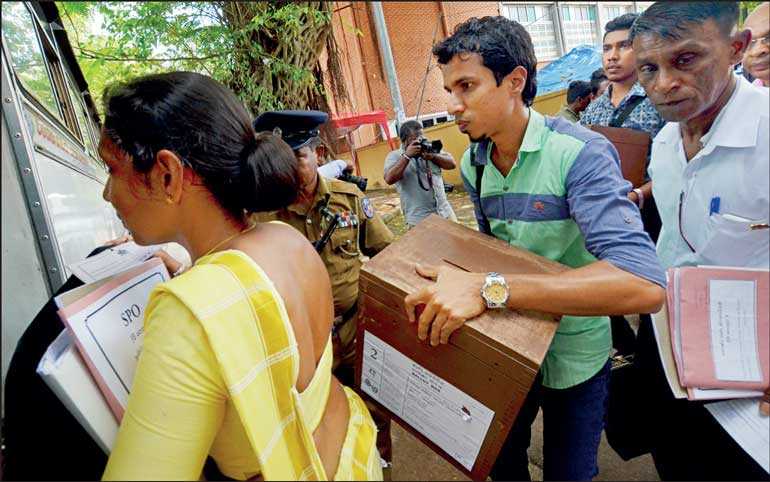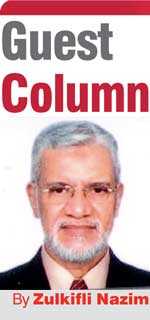Tuesday Feb 17, 2026
Tuesday Feb 17, 2026
Thursday, 12 March 2020 00:00 - - {{hitsCtrl.values.hits}}

“Politics and communication are nearly synonymous; all politics, after all, is nothing more and nothing less than communication applied in the service of power. Only by understanding the relative access to and control over information and communications technology, which has grown ever more complex over the centuries, can we understand the ebb and flow of politics, of culture, and of the human condition itself” – William Bernstein
Everything a politician utters, they say, goes viral. The establishment despises them, donors can’t influence them, and the media cannot tame them. They have ignored the traditional rules of politics and now, politics will never be the same. Their success is a threat to the progress of our country.
Looking at the striking parallels between commerce, education, and politics, it isn’t just coincidence. In fact, it’s inevitable. In the past decade, the information environment has inverted from information scarcity to information abundance, and the effects are evident in every corner of society.
In political science, the ‘Overton Window’ represents the range of acceptable opinions in society. The Overton Window is the range of policies politically acceptable to the mainstream population at a given time. It is also known as the window of discourse. Rather than controlling speech itself, people can control speech by determining the limits of acceptable conversation.
Before cable and satellite TV invaded our world, the limits of acceptable speech were enforced by political parties, who, due to their incentives for mass appeal, encouraged political centrism. With the stroke of a pen, small groups set narratives for the masses. Newspapers and television stations monopolised the distribution of information within their local territory. Through their power, they built social cohesion by eliminating diverse opinion and creating a shared intellectual ground.
Pundits appear eager to portray the partisan battles waged during election time as reaching new lows where dirty politics were concerned. Yet despite massive media interest in dirty politics and academic investigations into many aspects of this soft underbelly of democratic elections, very little is known about the way the public responds to news about dirty politics –whether the misdeed is a vandalism or a more serious allegation of election fraud. The public is not neutral when news about a political misdeed surfaces – instead the public sees the misdeed through partisan lenses.
Political parties depended on the media to spread their ideas. Through favours and relationships, political parties win elections for their politicians. Similar to media, commerce, and education, the status quo stayed the same. Like lions in the wild, wealthy and connected our local politicians and their families thrived in the mass media environment. Like in commerce and education, political outcomes perpetuated the status quo. Money and connections with the media swayed elections as much as the voters themselves.
Now many in the media and the public are discovering what psychologists and political scientists have long known: people engage in motivated reasoning, which means that citizens are biased information processors who uncritically accept favourable information about their party or team, but disdain, disapprove and reject unfavourable information about their side.
In other words, according to the theory of motivated reasoning, subjects typically show contempt by derision and ridicule that causes cognitive dissonance – that is, good news about the opposition or bad news about one’s party.
We have concern that runs deeper than this regarding motivated reasoning. While it is not new nor very surprising that people interpret the meaning of facts and deem their importance according to their partisan orientations.
Media monopoly
The media’s monopoly saw its first cracks with the rise of cable, and now, due to Satellite TV and the internet, the mass media environment is going to crumble. The internet – where everyone can find, select, edit, and distribute content – has already left its mark. The Overton Window has been shattered. The media is no longer a barrier against diverse thought and opinion. Extreme opinions, which were once squashed by the mass media environment, can survive on the internet, where a viral message can spread to every corner of the globe. In response to the new media environment, political parties have adopted a new set of rules and strategies.
The new communication technologies that see technology as the catalyst of the social and political changes. Media creates an apathy in which people are content to ‘know’ rather than ‘do’ something. In this context, media provides information about the events and the receivers demonstrate some superficial concern on media about the events while the importance of real action is neglected. Consequently, the receivers are drugged into the inactivity like they are under the influence of narcotics. One of the main assumptions of this approach is that, increasing dosages of mass communications sometimes ‘unpredictably’ transform the energies of the receivers from ‘active participation’ into ‘passive knowledge’.
Exposure to this flood of information may serve to narcotise rather than to energise the average reader or listener.
The interested and informed citizen can congratulate himself on his lofty state of interest and information and neglect to see that he has abstained from decision and action. He comes to mistake knowing about problems of the day for doing something about them. His social conscience remains spotlessly clean. He is concerned. He is informed. And he has all sorts of ideas as to what should be done. But, after he has gotten through his dinner and after he has listened to his favoured radio programs and after he has listened to the repeated late news telecast of the day, it is really time for bed.
Disinformation on social media can negatively impact our elections. Election-related misinformation could keep registered voters from the polls. Provision must be made by law for officials to report and correct bad information that appears on social media.
Confronting that tsunami of distortion is a challenge even for the most powerful officials.
Political parties are a set of relationships and a wealth of tactical knowledge. They consist of partisan media members, advertisers, donors, associations, interest groups, consultants, and of course, politicians. Political parties built intimate relationships with donors to fund their advertising efforts.
Voter interests were a means, not an end. In exchange for voter support, political parties ensured the election of their politicians by building relationships with editors, journalists, and media executives.
Can we detect a change in this trend?
Understanding trends and patterns helps election officials communicate proactively. The Government has to address a serious and growing problem impacting elections. Social media can be an unreliable source. Platforms circulate and amplify disinformation and distortion from legitimate-sounding sources so quickly that fiction appears as truth. Those posts get liked and shared, and the lies spread.
In an ideal world, elections should be two things: free and fair. Every adult, with a few sensible exceptions, should be able to vote for a candidate of their choice, and each single vote should be worth the same.
The many democratic electoral systems in use around the world attempt to establish political considerations such as accountability and the need for strong, stable government. This system scores well on stability and accountability, but in terms of fairness it is a dud. People have developed a system where votes for anyone other than the winning candidate are frowned upon and disregarded.
This is a critical issue that has to be addressed because: Elections are key to almost every other issue we work on, and they are the most important way to hold our political leaders accountable; the vote is the only political power that many people have; and our elections are not transparent, fair or honest today. Many citizens are denied the right to vote or are severely discouraged from voting. There is much evidence that past elections have been hacked and almost all elections systems are still very vulnerable to electronic distortion whether from insiders, corporate interests or foreign countries. Election outcomes are also often rigged through gerrymandering where Voting Districts are divided unfairly to one’s advantage; and the lack of limits on campaign spending encourages corruption and control of elections by the rich and powerful.
Millions are being spent on political campaigns, but only pennies to protect the vote itself. The primary focus should be to reform the election process – voter suppression must be totally abolished so that all citizens can vote and all votes are counted accurately. And the election will absolutely be free, fair, transparent and honest; and accurately reflect the will of the majority of the people.
Max Weber’s image of a society without a soul has become something of a popular lament. People are not always articulate about their discontents, but numerous signs – unstable voting patterns, a return to religious orthodoxy, increases in antisocial behaviour, opposition to scientific and technological advance, a withdrawal from public issues into private worlds, and the rise of irrationality – indicate, for reasons both sound and unsound, a feeling of discontent with progress. Capitalist economics and liberal democratic politics have prepared the basis for the good life, but its actual attainment seems just beyond the possible.